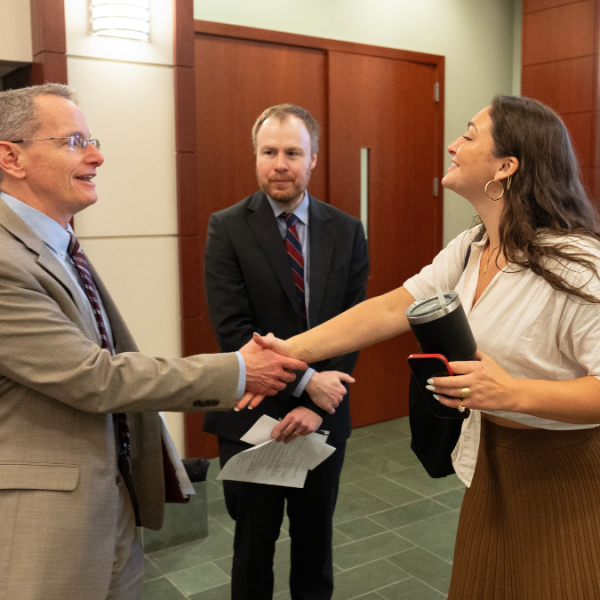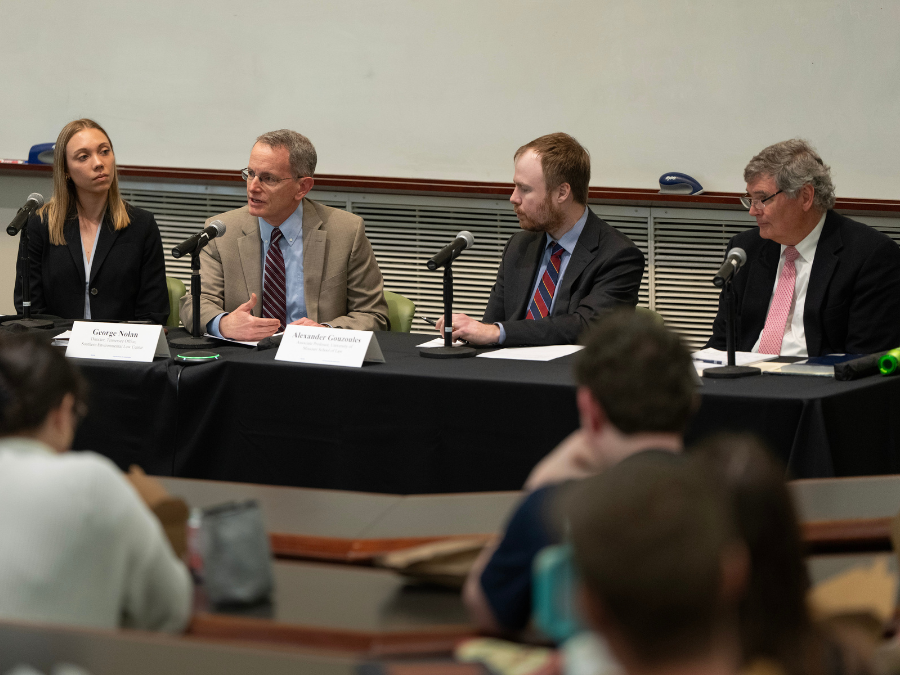By Kyle J. Blasinsky and Robert Binkowski
On Monday, March 4, 2024, the Environmental Law & Policy Annual Review (ELPAR) hosted its annual Nashville Conference, which featured Professor Alexander Gouzoules, Associate Professor of Law at the University of Missouri School of Law. The Conference focused on Professor Gouzoules’ ELPAR-recognized article: “Going Concerns and Environmental Concerns: Mitigating Climate Change Through Bankruptcy Reform.” The Article was previously published in the Boston College Law Review and was selected for honorable mention in the 2023–2024 issue of ELPAR. The piece was a ready pick for recognition given its creative, feasible approach to addressing the clean energy transition through bankruptcy law reform.
 The Conference officially began at 12:30 p.m. with opening remarks from ELPAR co-instructors Linda K. Breggin and Michael P. Vandenbergh. Nick Summers ’25, ELPAR’s 2024–2025 Executive Editor, added additional context tailored to the 1L students in the audience who can apply to join ELPAR during the annual write-on process in which rising 2Ls compete for spots on Vanderbilt’s student-edited law journals. Mr. Summers highlighted ELPAR’s policy focus, noting editors’ opportunities to “shape the academic and policy conversations that are happening around the nation on environmental issues, to connect policymakers with practical policy solutions, [and] to develop important skills that will help benefit [students’ careers].” He then handed the mic to Carrigan English ’24, ELPAR’s 2023–2024 Symposium Editor, to introduce the conference panelists and to moderate the ensuing discussion.
The Conference officially began at 12:30 p.m. with opening remarks from ELPAR co-instructors Linda K. Breggin and Michael P. Vandenbergh. Nick Summers ’25, ELPAR’s 2024–2025 Executive Editor, added additional context tailored to the 1L students in the audience who can apply to join ELPAR during the annual write-on process in which rising 2Ls compete for spots on Vanderbilt’s student-edited law journals. Mr. Summers highlighted ELPAR’s policy focus, noting editors’ opportunities to “shape the academic and policy conversations that are happening around the nation on environmental issues, to connect policymakers with practical policy solutions, [and] to develop important skills that will help benefit [students’ careers].” He then handed the mic to Carrigan English ’24, ELPAR’s 2023–2024 Symposium Editor, to introduce the conference panelists and to moderate the ensuing discussion.
Joining Professor Gouzoules were Bill Norton and George Nolan. Mr. Norton is a Partner at Bradley Arant Boult Cummings who has practiced in the business-bankruptcy area since beginning his legal career in 1982. He is also an Adjunct Professor of Law at Vanderbilt Law School, where he teaches bankruptcy. Mr. Nolan is Director of the Tennessee Office of the Southern Environmental Law Center (SELC) and was formerly a Member at Boult Cummings Conners & Berry.
Professor Gouzoules began with a comment on the status of progress already made at both the domestic and international levels on energy governance and briefly summarized the issue at hand. In essence, Chapter 11 of the Bankruptcy Code permits extractive firms to survive during price collapses, only to expand production as prices recover; instead, insolvent fossil fuel producers should be required to go into Chapter 7 liquidation and be appointed an environmental trustee. He then explained the connection between bankruptcy law and climate change governance, a pair of topics that might not seem obviously intertwined, and the existing tension between bankruptcy and climate change mitigation goals with respect to fossil fuel firms. “Taking a market-based approach,” Professor Gouzoules stated, “there will have to be a point when renewables are reliably outcompeting fossil fuels.” And because bankruptcy’s main goal is preventing value destruction, Professor Gouzoules reasoned that bankruptcy law can be adapted to encourage stakeholders to walk away from fossil fuel usage—rather than just reorganize under Chapter 11—and further the clean energy transition in light of market shifts already taking place. Specifically, Professor Gouzoules proposed a “special reorganization scheme” for fossil fuel firms, the primary component of which would foreclose Chapter 11 bankruptcy for these firms. He further argued that this would align fossil fuel firms’ treatment in the bankruptcy code with other industries, such as stock and commodities brokers, who are already barred from accessing Chapter 11.

Professor Gouzoules’ thought-provoking presentation was followed by comments and questions from Mr. Norton, Mr. Nolan, and the student audience. With a Congress plagued by partisan gridlock, Mr. Norton’s first question was a simple one:
“Is this feasible?” His conclusion was yes—for many of the reasons Professor Gouzoules had previously articulated. Mr. Norton’s comments added a valuable perspective, drawing on his extensive experience in both private practice and academia and straddling the worlds of bankruptcy practice and bankruptcy theory. While acknowledging concerns about regulators’ ability to pull together and pass Professor Gouzoules’ recommended bankruptcy code amendments, Mr. Norton still spoke highly of the policy proposals and the Article more broadly. Likewise, Mr. Nolan, speaking from his experience in public interest legal practice, was especially interested in the bankruptcy parallels Professor Gouzoules drew between the fossil fuel and railroad industries and how those analogies related to SELC’s work intervening in eminent domain proceedings concerning new fossil fuel pipelines. Thinking of the bigger picture, too, Mr. Nolan inquired about the broader effects the proposed policies would have on lending markets within the energy industry.
Before concluding, Ms. English led the panel in question-and-answer (Q&A) style discussion that further explored the political feasibility of Professor Gouzoules’ proposed reforms. While acknowledging the short-term difficulty in passing environmentally conscious bankruptcy reforms, or any other substantive environmental law, Professor Gouzoules remained optimistic that his proposed reforms could be enacted in the long run, in part because the firms affected would by definition be firms that have already failed—and potentially insolvent firms tend to have fewer defenders advocating on their behalf. The subsidy-based approach that has become pervasive in twenty-first century environmental law could be integrated into Professor Gouzoules’ proposals as well, another topic raised during the Q&A, but he remained skeptical that subsidies alone would be enough to get the United States where it needs to go.
Beyond the future of energy and environmental policy, Professor Gouzoules—who practiced commercial law as an associate, first at Paul, Weiss, Rifkind, Wharton & Garrison and later at Willkie Farr & Gallagher, before joining the faculty at the University of Missouri—also offered the many future lawyers in attendance advice as they begin their own legal journeys: “When you enter into your legal practice, particularly early on, I just can’t recommend enough staying . . . nimble and open-minded to assignments and areas that you didn’t envision yourself practicing in.”
The complete panel discussion is available for viewing on ELPAR’s website.
ELPAR is a collaboration between the Environmental Law Institute (ELI) and Vanderbilt Law School (VLS). Published annually as the August issue of the Environmental Law Reporter, ELPAR is a one-issue, student-edited publication bridging the gap between legal academics and policymakers. After reviewing the vast environmental law literature published in the prior year, VLS students—with guidance from an expert advisory committee, ELI senior staff, and course instructors Michael P. Vandenbergh and Linda K. Breggin—select the articles with the most creative, politically feasible, and impactful environmental policy solutions for recognition in ELPAR.
Kyle J. Blasinsky is ELPAR’s 2023–2024 Editor-in-Chief, and Robert Binkowski is ELPAR’s 2023–2024 Web Editor.